Since the adoption of the Paris Climate Targets respectively the UN Sustainable Development Goals in 2015, financial investors are successively involved in the measures e.g. to reduce global warming. In this context, new investments are to be steered towards sustainable investments in a targeted manner. As a prerequisite, however, there are still a number of unresolved issues to be clarified, e.g. with regard to the classification of sustainable business and the consideration of customer preferences.
Since 2019, various legislative initiatives have been launched on the basis of the EU Action Plan, which are intended to create a reliable framework for investors, issuers and financial service providers in the securities sector. Due to the already existing complex financial market regulation, the new requirements to take sustainability into account represent a major challenge for the financial industry. In addition to regulatory requirements, banks must meet customer needs while ensuring efficient implementation.
The timeline below gives you a first overview of the future regulatory requirements in the area of securities. If you have any questions or would like to exchange ideas, please do not hesitate to contact our experts.
Measures for sustainability and against climate change are more topical than ever, not only in politics and society. Also banks are taking on a special role in the financial markets, especially as lenders to companies, and are trying to present themselves as sustainable. Loans are to be granted to companies that leave no or a small carbon footprint, and investment offers are aimed at sustainable investments. It is also important for employees to work in a company that contributes its part to an ecologically, socially and sustainably oriented world.
Since 2019, a number of legislative initiatives based on the EU Action Plan have been launched, imposing new regulatory requirements on financial market participants in the area of financing. In particular, regulators have focused on risk management and lending. Climate and environmental risks, as well as the resulting transition risks, will have to be integrated in the lending process and in the existing management or monitoring of exposures of the different risk types in the future.
The timeline below provides an initial overview. If you have any questions or would like to exchange ideas, please do not hesitate to contact our experts.
On 07.07.2021, a new edition of Consileon’s Design Thinking talk will take place at the University of Hohenheim. This time Christoph Welle and Dr. Heiko Haller will give a guest lecture to about 300 students with a marketing/management focus.
Unlike other OEMs that coach executive teams or lead agile initiatives, both consultants develop an interactive format demonstrating the application of design thinking. Well-tested in the Corona era, this contribution is not limited to pure theory, but relies on interactive elements. Even in the online format with a split of two to 300, both consultants will use the time to practically test the method on a case study within breakout sessions and reflect meaningfully with the students. We are already looking forward to the contribution and the continued close contact between Consileon and the students.
Process Mining (PM) visualizes your business processes based on your data and offers a targeted and holistic evaluation of the processes. Through customized process mining sprints or a long-term oriented introduction of process mining software, we uncover optimization potential in your daily processes and contribute to quality improvement.
The efficiency of business processes such as turnaround times in healthcare is often limited by deviations, shortages or redundancies. Identifying and screening such obstacles is a challenging task, especially when important process data is unclear or difficult to access.
Our process mining experts are very familiar with the challenges of process improvement. In two process mining sprints, each lasting a maximum of two weeks, we accompany you from the creation of a data model, through process analysis, to the implementation of the optimized processes. Through a short-term project, we thus help you to achieve a sustainable rise in quality and sales.
Your ongoing process mining practice starts with introducing your company’s teams to the powerful features of process mining software. We select the appropriate software for your project and train your employees. The expertise gained through the pilot project will enable your company to steadily expand its implementation of process optimization with PM afterward.
We analyze a process of your choice for a fixed price and uncover optimization potential. Get in touch with our experts at Consileon without any commitment today.
Another milestone for Consileon! In December 2020, Consileon successfully completed the TISAX® assessment. TISAX® is a registered trademark of the ENX Association and stands for: Trusted Information Security Assessment Exchange. Here, the highest security standards in the automotive industry are defined, which are based on the international standard ISO/IEC 27001.
In a dynamic, global competitive environment, information security has become a decisive risk factor as well as a competitive factor in recent years. This is particularly true for the automotive industry, whose suppliers and relevant service providers exchange a great deal of data and information requiring protection every day.
By participating in the TISAX® assessment, we have demonstrated that we comply with the essential protection goals of information security, such as confidentiality, availability, integrity and authenticity of our data.
In this way, we prove to our customers, business partners and employees that all data and information are adequately protected. This sets the course for successful and trusting cooperation as a certified partner and at the same time fulfills the requirements of various regulations.
In addition to the work of our Information Security Risk Steering Committee, Consileon also strengthens employee awareness of information and data security through ongoing training and awareness campaigns.
With individual customer contact becoming increasingly important, it is extremely important for sales representatives to keep track of their contacts with customers. The application SCOPmi – Strategic Customer Contact Management with Process Mining was developed in cooperation between Consileon , Lüdke+Döbele and PMC. It helps their sales representatives plan and manage customer contacts more strategically, as well as better understand contact order and customer needs and to create customer journeys more easily.
Your sales force can reach out to customers precisely and individually when they use all of the available communication channels. Multichannel communication can, however, create many problems.
SCOPmi addresses exactly this point and helps your employees face these challenges:
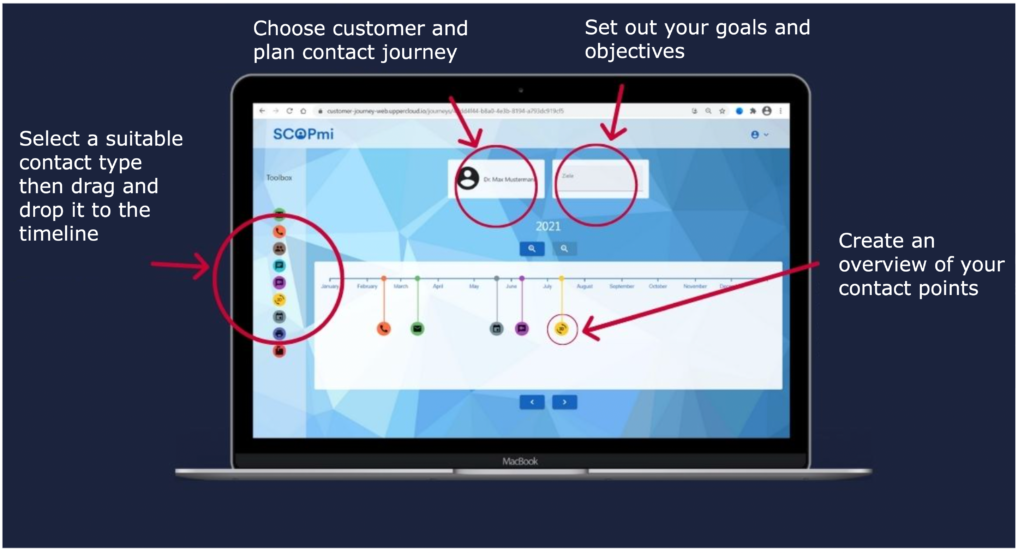
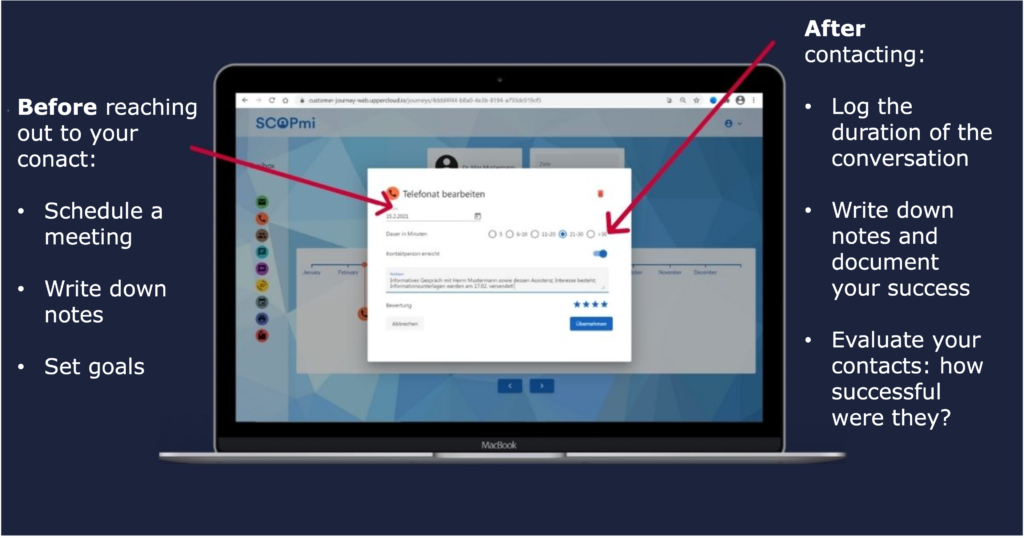

Using the SCOPmi app, you get all of the above! Simple, fast, and clear over an app.
(The document is in German.)
Karlsruhe, June 18, 2021 – In cooperation with Kinderhilfe Diekholzen, Consileon has donated 100 “comfort teddy bears” for young patients to the Karlsruhe Children’s Hospital (Kinderklinik Karlsruhe) and the German Red Cross (DRK). In doing so, the Karlsruhe-based consulting firm is following up on various previous donation campaigns that have been used for several years to support targeted initiatives for needy children in Germany and around the world.
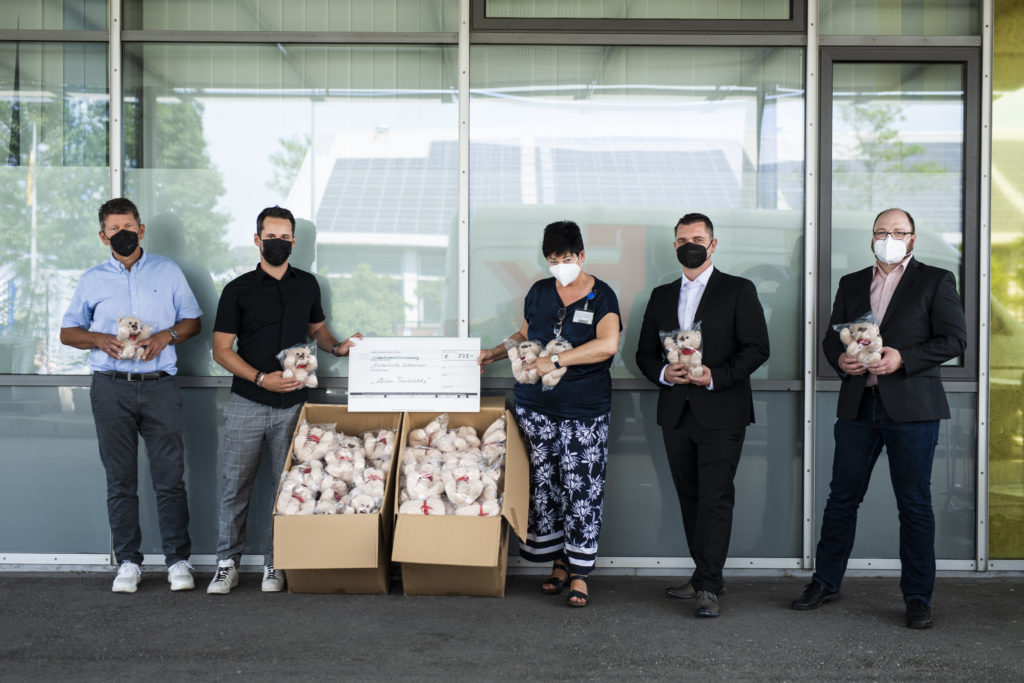
“In times of Corona, hospitalization hits children and their families particularly hard. Visits are often not possible due to the pandemic. In addition, hospital staff are working at the absolute limit of their capacity even more than ever before,” explains Consileon founder and managing partner Dr. Joachim Schü. “We heard about the ‘Trösteteddy’ campaign of Kinderhilfe Diekholzen and decided straight away to take part. The stuffed animals provide amusement in the hospital, bring joy to the children and thus also support the staff in their hard work.”
For this reason, Consileon has now donated 100 teddy bears worth a total of around 1,500 euros, which meet all legal and health requirements such as CE testing and freedom from harmful substances. 50 comforters each will go to the Karlsruhe Municipal Hospital and the German Red Cross in Bruchsal: Tobias Leibach, Marketing Manager at Consileon, presented the donation to the head of nursing at the children’s hospital, Sabine Murawski, on June 17, 2021. “The ‘comfort teddy bears’ make an important contribution to our work because we can encourage our little patients with a cuddly friend in difficult moments,” says Sabine Murawski, who is delighted with the donation.
The initiator of the “Trösteteddy” initiative is Kinderhilfe Diekholzen, which is committed to promoting child and youth welfare and public health. “We are glad that we were able to win Consileon as a generous sponsor for our campaign and thus continue our work in the region,” Martin Ziss of Kinderhilfe Diekholzen is enthusiastic.
With this fundraising campaign, the Consileon group is continuing its long-standing support for various regional, nationwide and international initiatives for children in emergency situations. “We have once again significantly expanded our commitment to social aid projects since the beginning of the Corona crisis,” says Dr. Joachim Schü. “As part of our corporate responsibility, we would like to help above all needy children who have been hit hard by crises and strokes of fate.”
Further information on the Consileon Group’s social commitment can be found at https://www.consileon.de/en/responsibility/.
As the control center and point of contact for the project teams, the PMO keeps the project portfolio of a company under control. Consileon offers this highly demanding function as a service – PMO as a Service (PMOaaS). In two decades of practice as a project and IT service provider, we have collected best practices for this.

We determine the need for PMO services per project phase on the basis of specifications such as the project object, scope and complexity. This avoids idle time as well as delays due to staff shortages.
Throughout the duration of the project, the PMO maintains an overview of the current workload and short-term availability of its staff, including potential reserve staff.
In addition to the current workload of the PMO, the delivery manager can display success statistics from all projects. This helps when making decisions about staffing the team with internal and external forces.
If desired, the services booked in the catalog are automatically forwarded to the PMO for order acceptance. After acceptance, the system generates the orders and specifications to the PMO team from the order data.
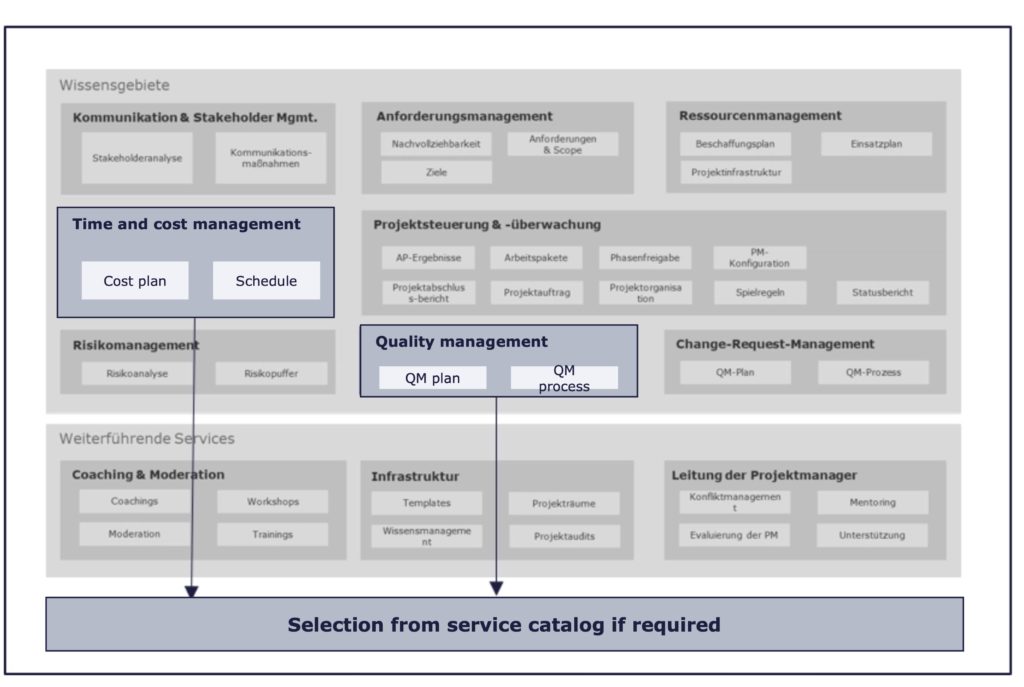
Programmed rules for automatic forwarding of support requests to the responsible agents and back shorten the official channels.
Once the project manager has officially accepted a service in the system, it is automatically billed according to the contract. This reduces the PMO’s administrative workload, and we pass the cost advantage on to you.
Our PMO provides dashboards to help customers monitor and manage budgets, schedules, and quality results at any level of cooperation with our PMO – strategic, organizational, operational. In addition to progress and status information, project managers and delivery managers can also find continuously updated performance data to assist in quality control and optimization.
The more projects run in parallel in a company, the more difficult it becomes to maintain an overview, prioritize projects, allocate resources, and avoid duplication of work. Cross-cutting tasks such as these are handled by a project management office (PMO) as the control center and point of contact for the project teams. Consileon offers PMO as a service (PMOaaS) so that smaller or less methodologically experienced companies can also benefit from it. The focus is on the following goals:
Our PMO Team takes on all the tasks involved in achieving these goals, from communication with stakeholders to requirements management, scheduling, staff planning, cost control, project control, risk management, quality assurance and change management.
In many years of practice, we have developed our own project framework, which is based on internationally recognized methods such as PMI and PRINCE2. The framework has a modular structure. Each module contains templates, models and groupware for a project phase – from personnel deployment and time planning to quality assurance, controlling and documentation. With this construction kit, the PMO maps your projects holistically and rationally. For group projects, the framework also facilitates coordination and system integration among stakeholders.
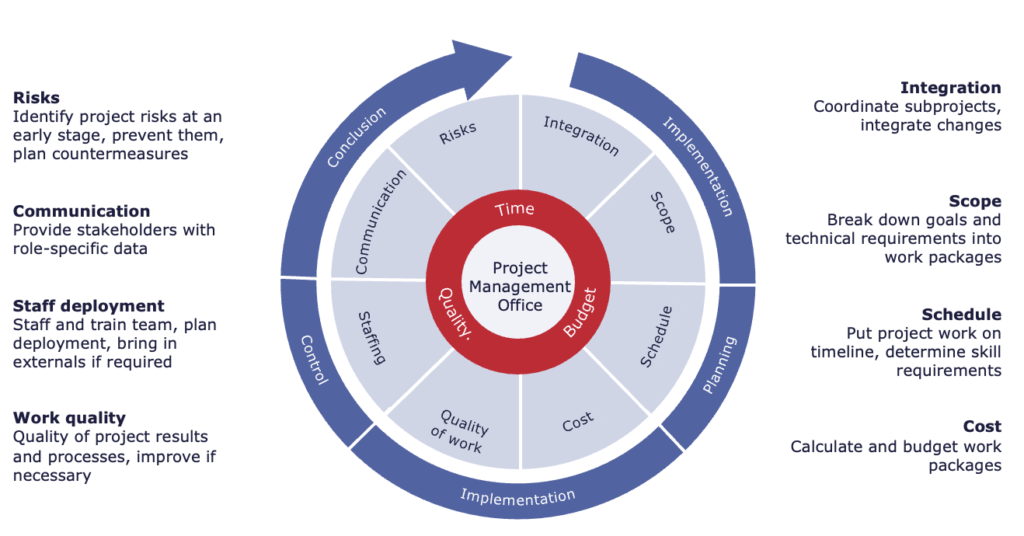
Your collaboration with our PMO is divided into seven phases.
In all project phases, we subject the work of the PMO to continuous performance reviews, the results of which we report to you on a regular basis.
The services of the PMO are divided into four classes: One-time service, rotational service, workflow responsibility, full service. You choose from this range according to your needs. In addition, you clarify with us in advance of the cooperation the proportionate staffing of the PMO from your employees and external forces.
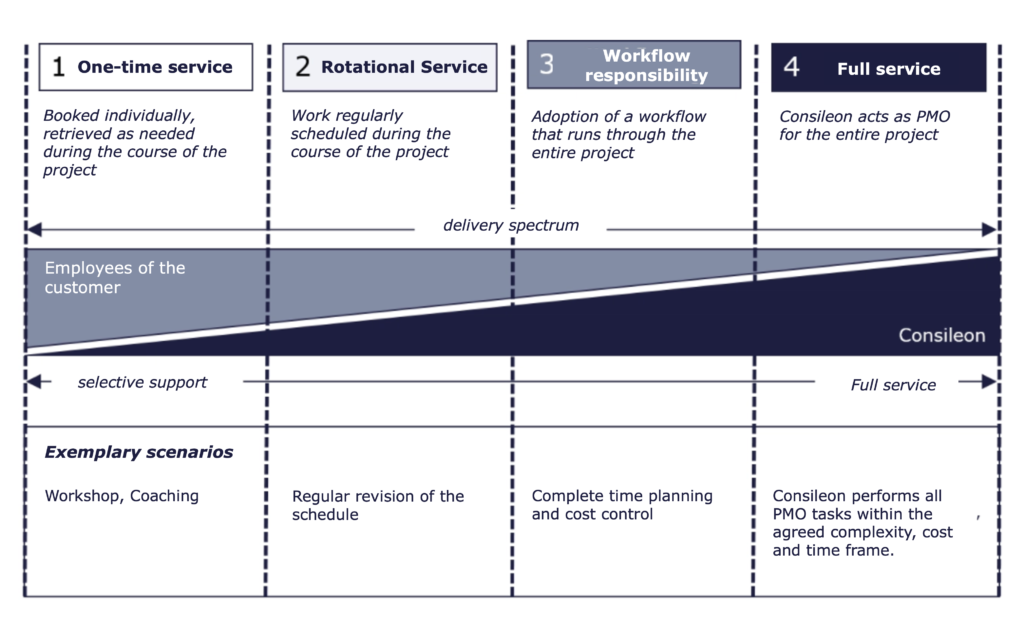
An overview diagram shows our fields of knowledge and services. Tabular profiles provide details. We define the scope and quality of our services with you in a service level agreement (SLA), and use key figures to measure and report on success.
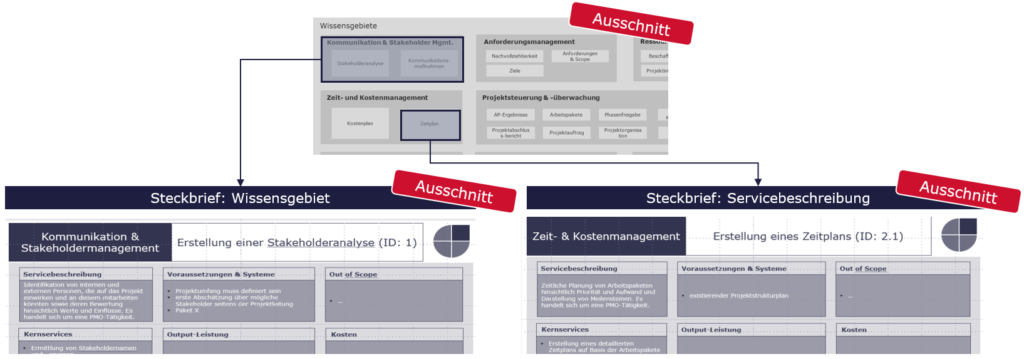
The Service Level Agreement specifies a service agreed by terms of a service or hire contract. Its object can be a one-off service, a rotational service or a service package. Compliance with the SLA is measured by three key figures: Response time, processing time, result quality. The specifications for each key figure are graded according to three priority levels.
The collection of the key figures specified in the SLA serves not only to measure progress and work quality, but also to provide statistics and trend forecasts for medium- and long-term optimization. We report these figures to you on a weekly or monthly basis. It is also possible to have a real-time, continuous display (live tracking) of the key figures on a dashboard. Deviations of the actual performance from the targets from the SLA are analyzed, and the target is adjusted if necessary. We recommend such an in-depth statistical evaluation, including comparison with the previous period, at quarterly or half-yearly intervals
You work with our PMO on three levels: the strategic, the organizational and the operational level, the day-to-day project work. On the strategic level, we define the tasks of the PMO in coordination rounds with the following stakeholders, and monitor and control its work.
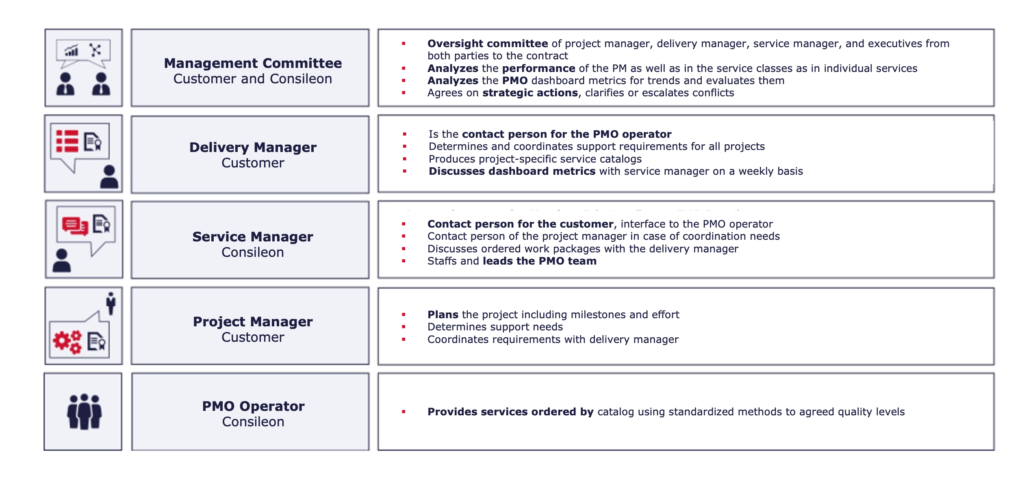
Via an order mask, the project manager selects PMO services and the desired frequency from the catalog at the click of a mouse. Mandatory fields in the mask ask for all the parameters that the office needs for deployment planning. If a team wants to use more one-off services, regular services or service packages later in the project, they simply order them from the catalog.
Support requests flow into a ticket system. In addition to SLAs, key figures, and the schedule, current statuses are stored there, including ongoing projects and requests, the current workload of the PMO, and quality statistics. The delivery manager views the tickets, forwards them to the specialists and monitors the processing. The ticket system thus forms the most important interface between project manager and PMO. Billing is done by projects, services or packages on a quarterly or semi-annual basis.
Through regular mutual feedback, the interaction between the project teams and the external PMO runs better and better. Feedback includes a target/actual comparison, which is documented for statistical purposes. A checklist helps with acceptance and evaluation. Questionnaires with analysis and reporting functions determine how the project parties have solved acute problems in each case.
We tailor our PMO as a Service to the needs of the customer company. The service manager we deploy ensures that everything runs smoothly….
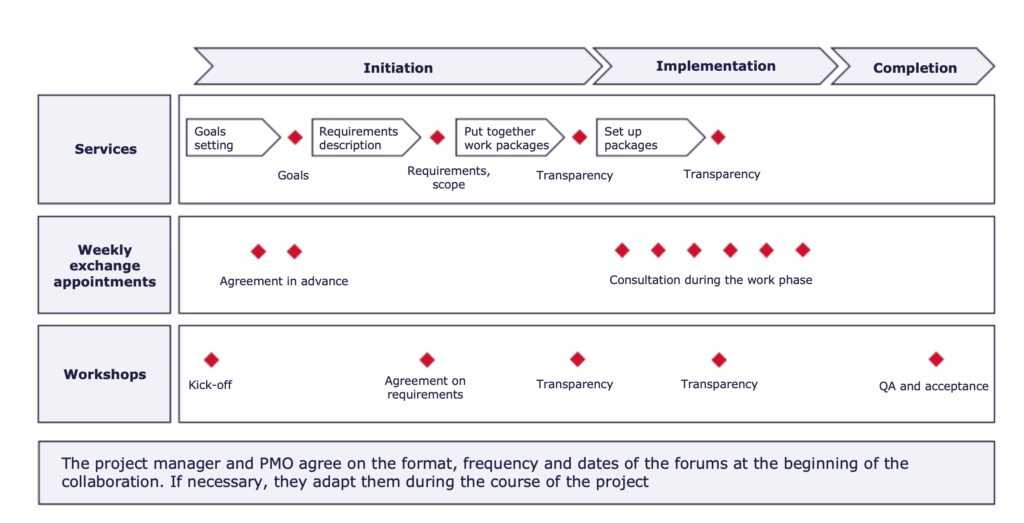
Teleworking is part of everyday life at Consileon. We know what it means to manage projects with virtual teams of face-to-face staff and teleworkers. Even if the distance between colleagues is longer, goals and tasks need to be communicated quickly and clearly. To make this possible, we support you with groupware for project tracking, brainstorming and conferences, among other things.
The Krankenhauszukunftsgesetz (KHZG – Hospital Futures Act) offers all hospitals and university clinics the opportunity to drive forward digitization and modernization at their own facilities by receiving funding from the Krankenhauszukunftsfonds (Hospital Futures Fund). But the time is running out… Only the German states of Baden-Württemberg, Bremen, Hamburg, Hesse, Lower Saxony, Saarland, Saxony-Anhalt and Thuringia are still open for the funding application. In Bavaria, Berlin and Rheinland-Pfalz, the post-allocation procedure is already pending.
Have you not taken action yet? Then it is time to do so now! As a certified KHZG IT service provider, we support you in submitting your application on time and successfully. Contact our certified experts today. We look forward to hearing from you.
[1] , e.g. patient portals, electronic documentation of care and treatment services, digital medication management, IT security measures and cross-sector telemedicine network structures